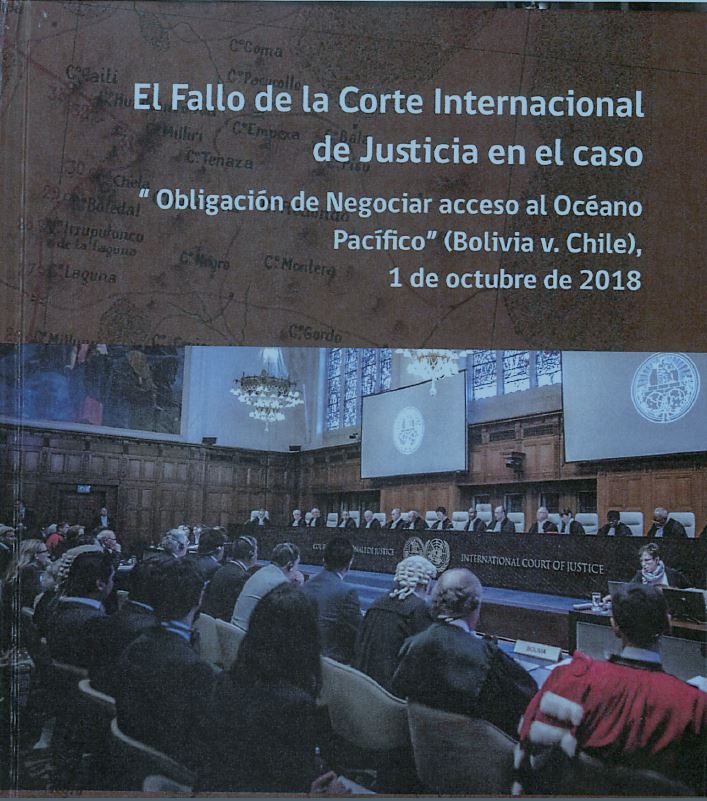Dean Emeritus Claudio Grossman Publishes About Chilean Legal Strategy in Bolivia v. Chile

Claudio Grossman, El Fallo de la Corte Internacional de Justicia en el caso “Obligación de Negociar acceso al Océano Pacífico” (Bolivia v. Chile), 1 de octubre de 2018, [The Judgment of the International Court of Justice in the Case “Obligation to Negotiate Access to the Pacific Ocean” (Bolivia v. Chile), 1 October 2018], Ministerio de Relaciones Exteriores de Chile, Santiago de Chile, 2019
AUWCL Dean Emeritus and Professor of Law Claudio Grossman served as Agent for Chile for the final stretch of the proceedings. So it is natural that also Prof. Claudio Grossman wrote the main chapter of the book about “The Chilean Legal Strategy.”
The book takes stock of both sides’ legal arguments in this case and the development of the procedure. The case was hard fought. In April 2013, Bolivia filed an Application instituting proceedings against Chile concerning a dispute in relation to an alleged “Chile’s obligation to negotiate in good faith and effectively with Bolivia in order to reach an agreement granting Bolivia a fully sovereign access to the Pacific Ocean”. Chile replied on July 15, 2014 and filed a preliminary objection to the jurisdiction of the Court. In a judgment of September 24, 2015, the Court rejected the preliminary objection and found that it had jurisdiction, on the basis of Article XXXI of the Pact of Bogotá.
The Court delivered its Judgment on the merits on 1 October 2018 in which it responded to all of Bolivia’s arguments and alleged bases for its claim of an obligation to negotiate sovereign access to the Ocean. In particular, the Court found that the bilateral instruments invoked by Bolivia do not establish an obligation on Chile to negotiate Bolivia’s sovereign access to the Pacific Ocean; that an obligation to negotiate Bolivia’s sovereign access to the sea cannot rest on any of Chile’s unilateral acts referred to by Bolivia; that the alleged acquiescence of Chile cannot be considered a legal basis of an obligation to negotiate Bolivia’s sovereign access to the sea; that estoppel cannot provide a legal basis for Chile’s obligation to negotiate Bolivia’s sovereign access to the sea; that there does not exist in general international law a principle that would give rise to an obligation on the basis of what could be considered a legitimate expectation and, consequently, Bolivia’s argument based on legitimate expectations cannot be sustained; that the provisions of the United Nations Charter and the Organization of American States (OAS) Charter invoked by Bolivia could not be the legal basis of an obligation to negotiate Bolivia’s sovereign access to the sea; that the Court cannot infer from the content of the OAS resolutions nor from Chile’s position with respect to their adoption that Chile has accepted an obligation to negotiate Bolivia’s sovereign access to the Pacific Ocean; that, given that its analysis shows that no obligation to negotiate Bolivia’s sovereign access to the Pacific Ocean has arisen for Chile from any of the invoked legal bases taken individually, a cumulative consideration of the various bases cannot add to the overall result.
In his chapter, Prof. Claudio Grossman explains the procedural and the substantive background and context of the case. The book also features Claudio Grossman’s speeches before the Court in his capacity as Agent for Chile, and in which he explained to the Court the position of Chile. As he notes in his chapter about the case, one important element of the strategy consisted in developing Chile’s own narrative of the facts that Bolivia obviously had re-interpreted to suit its own needs. In his introduction to the book, the Chilean Minister of Foreign Affairs, Teodoro Ribera, underlines that the book is a valuable source to understand the mechanics of a case that has been very important for the country’s history. The Minister also recognizes that the case is an important testimony to the importance international law has today. This is, of course, a refreshing comment in our current times in which it so often seems that chaos rather than law reigns our world.